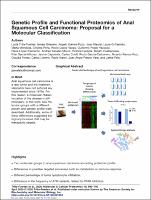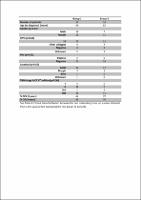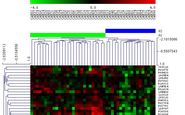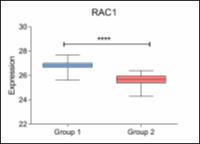| dc.contributor | Vall d'Hebron Barcelona Hospital Campus |
| dc.contributor.author | Trilla-Fuertes, Lucía |
| dc.contributor.author | Ghanem, Ismael |
| dc.contributor.author | Gámez‑Pozo, Angelo |
| dc.contributor.author | Maurel, Joan |
| dc.contributor.author | G-Pastrián, Laura |
| dc.contributor.author | Mendiola, Marta |
| dc.contributor.author | Capdevila Castillon, Jaume |
| dc.date.accessioned | 2021-10-22T14:43:22Z |
| dc.date.available | 2021-10-22T14:43:22Z |
| dc.date.issued | 2020-04 |
| dc.identifier.citation | Trilla-Fuertes L, Ghanem I, Gámez-Pozo A, Maurel J, G-Pastrián L, Mendiola M, et al. Genetic profile and functional proteomics of anal squamous cell carcinoma: proposal for a molecular classification. Mol Cell Proteomics. 2020 Apr;19(4):690–700. |
| dc.identifier.issn | 1535-9484 |
| dc.identifier.uri | https://hdl.handle.net/11351/6458 |
| dc.description | Anal squamous cell carcinoma; Molecular biology; Proteomics |
| dc.description.abstract | Anal squamous cell carcinoma is a rare tumor. Chemo-radiotherapy yields a 50% 3-year relapse-free survival rate in advanced anal cancer, so improved predictive markers and therapeutic options are needed. High-throughput proteomics and whole-exome sequencing were performed in 46 paraffin samples from anal squamous cell carcinoma patients. Hierarchical clustering was used to establish groups de novo. Then, probabilistic graphical models were used to study the differences between groups of patients at the biological process level. A molecular classification into two groups of patients was established, one group with increased expression of proteins related to adhesion, T lymphocytes and glycolysis; and the other group with increased expression of proteins related to translation and ribosomes. The functional analysis by the probabilistic graphical model showed that these two groups presented differences in metabolism, mitochondria, translation, splicing and adhesion processes. Additionally, these groups showed different frequencies of genetic variants in some genes, such as ATM, SLFN11 and DST. Finally, genetic and proteomic characteristics of these groups suggested the use of some possible targeted therapies, such as PARP inhibitors or immunotherapy. |
| dc.language.iso | eng |
| dc.publisher | American Society for Biochemistry and Molecular Biology |
| dc.relation.ispartofseries | Molecular & Cellular Proteomics;19(4) |
| dc.rights | Attribution 4.0 International |
| dc.rights.uri | http://creativecommons.org/licenses/by/4.0/ |
| dc.source | Scientia |
| dc.subject | Recte - Càncer - Aspectes genètics |
| dc.subject.mesh | Carcinoma, Squamous Cell |
| dc.subject.mesh | Anus Neoplasms |
| dc.subject.mesh | /genetics |
| dc.title | Genetic profile and functional proteomics of anal squamous cell carcinoma: proposal for a molecular classification |
| dc.type | info:eu-repo/semantics/article |
| dc.identifier.doi | 10.1074/mcp.RA120.001954 |
| dc.subject.decs | carcinoma de células escamosas |
| dc.subject.decs | neoplasias del ano |
| dc.subject.decs | /genética |
| dc.relation.publishversion | https://doi.org/10.1074/mcp.RA120.001954 |
| dc.type.version | info:eu-repo/semantics/publishedVersion |
| dc.audience | Professionals |
| dc.contributor.organismes | Institut Català de la Salut |
| dc.contributor.authoraffiliation | [Trilla-Fuertes L] Biomedica Molecular Medicine SL, C/ Faraday 7, 28049, Madrid, Spain. [Ghanem I] Medical Oncology Department, Hospital Universitario La Paz, Paseo de la Castellana 261, 28046, Madrid, Spain. [Gámez-Pozo A] Molecular Oncology & Pathology Lab, Institute of Medical and Molecular Genetics-INGEMM, Hospital Universitario La Paz -IdiPAZ, Paseo de la Castellana 261, 28046, Madrid, Spain. [Maurel J] Medical Oncology Department, Hospital Clinic of Barcelona, Translational Genomics and Targeted Therapeutics in Solid Tumors Group, IDIBAPS, University of Barcelona, Carrer de Villarroel 170, 08036, Barcelona, Spain. [G-Pastrián L] Pathology Department, Hospital Universitario La Paz, Paseo de la Castellana 261, 28046, Madrid, Spain; Molecular Pathology and Therapeutic Targets Group, Hospital Universitario La Paz-IdiPAZ, Paseo de la Castellana 261, 28046, Madrid, Spain. [Mendiola M] Molecular Pathology and Therapeutic Targets Group, Hospital Universitario La Paz-IdiPAZ, Paseo de la Castellana 261, 28046, Madrid, Spain; Biomedical Research Networking Center on Oncology-CIBERONC, ISCIII, Av. Monforte de Lemos 5, 28029, Madrid, Spain. [Capdevila J] Servei d’Oncologia Mèdica, Vall Hebron Hospital Universitari, Barcelona, Spain. Vall Hebron Institute of Oncology (VHIO), Barcelona, Spain |
| dc.identifier.pmid | 32107283 |
| dc.identifier.wos | 000524532100011 |
| dc.relation.projectid | info:eu-repo/grantAgreement/ES/PE2013-2016/PI15%2F01310 |
| dc.rights.accessrights | info:eu-repo/semantics/openAccess |





